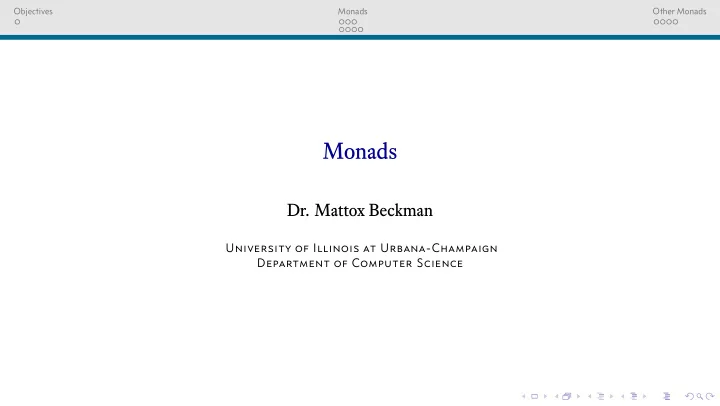

Objectives Monads Other Monads Monads Dr. Mattox Beckman University of Illinois at Urbana-Champaign Department of Computer Science
Objectives Monads Other Monads Objectives ◮ Describe the problem that monads attempt to solve. ◮ Know the three monad laws. ◮ Know the syntax for declaring monadic operations. ◮ Be able to give examples using the Maybe and List monads.
Objectives Monads Other Monads Introducing Monads ◮ Monads are a way of defjning computation. ◮ A monad is a container type m along with two functions: ◮ return :: a -> m a ◮ bind :: m a -> (a -> m b) -> m b ◮ In Haskell , bind is written as >>= ◮ These functions must obey three laws: Left identity return a >>= f is the same as f a . Right identity m >>= return is the same as m . Associativity (m >>= f) >>= g is the same as m >>= (\x -> f x >>= g) .
return a = Right a return a = Just a return a = [a] Objectives Monads Other Monads Understanding Return ◮ return :: a -> m a ◮ The return keyword takes an element and puts it into a monad. ◮ This is a one-way trip! ◮ Very much like pure in the applicative type class. 1 instance Monad Maybe where 2 3 instance Monad [] where 4 5 instance Monad ( Either a) where 6
-- Remember that f returns a monad >>= f = Nothing Objectives Monads Other Monads Understanding Bind ◮ All the magic happens in bind. ◮ bind :: m a -> (a -> m b) -> m b ◮ The fjrst argument is a monad. ◮ The second argument takes a monad, unpacks it, and repackages it with the help of the function argument. ◮ Exactly how it does that is the magic part. Bind for Maybe 1 Nothing 2 ( Just a) >>= f = f a 3
= Just (1 / a) | otherwise = Nothing Objectives Monads Other Monads Motivation ◮ They are similar to continuations, but even more powerful. ◮ They are also related to the applicative functors from last time. ◮ Consider this program: 1 inc1 a = a + 1 2 r1 = inc1 <$> Just 10 -- result: Just 11 3 r2 = inc1 <$> Nothing -- result: Nothing But what if we have functions like this? 1 inc2 a = Just (a + 1) 2 recip a | a =/ 0 3 How can we pass a Nothing to it? How can we use what we get from it?
Objectives Monads Other Monads Notice the Pattern ◮ Applicatives take the values out of the parameters, run them through a function, and then repackage the result for us. ◮ The functions have no control: the applicative makes all the decisions. ◮ Monads let the functions themselves decide what should happen.
b >>= ( \ bb -> return (aa + bb))) b >>= ( \ bb -> return (f aa bb))) Objectives Monads Other Monads A Calculator, with Monads 1 minc x = x >>= ( \ xx -> return (xx + 1)) 2 madd a b = a >>= ( \ aa -> 3 4 -- but wait!!! ◮ Okay, the above code works, but here’s a better way. ◮ First defjne functions lift to convert a function to monadic form for us! These are part of Control.Monad: 1 liftM f a = a >>= ( \ aa -> return (f aa)) 2 liftM2 f a b = a >>= ( \ aa -> 3
if bb == 0 then fail "/0" else return (aa `div` bb))) b >>= ( \ bb -> Objectives Monads Other Monads Continued Lifting 1 minc = liftM inc 2 madd = liftM2 add 3 msub = liftM2 sub 4 mdiv a b = a >>= ( \ aa -> 5 6 7 ◮ fail is another useful monadic function, defjned in the MonadFail typeclass. ◮ Here it’s defjned as Nothing .
( >>= ) ( Just a) f = f a = Nothing ( >>= ) Nothing f Objectives Monads Other Monads The Maybe Monad ◮ Here is the complete monad defjnition for Maybe. Maybe Monad 1 instance Monad Maybe where 2 return = Just 3 4 5 6 7 fail s = Nothing
Prelude> minc (Just 10) Just 11 Prelude> madd (minc (Just 10)) (Just 20) Just 31 Prelude> mdiv (minc (Just 10)) (minc (Just 2)) Just 3 Prelude> minc (mdiv (minc (Just 10)) (minc (Just 2))) Just 4 Prelude> minc (mdiv (minc (Just 10)) (Just 0)) Nothing Objectives Monads Other Monads Example with Maybe
return a = [a] ( >>= ) xs f fail s = [] = [] = concatMap f xs Objectives Monads Other Monads The List Monad ◮ Lists can be monads too. The trick is deciding what bind should do. List Monad 1 instance Monad [] where 2 3 4 ( >>= ) [] f 5 6 7 ◮ Note that we do not have to change anything in our lifted calculator example!
Prelude> minc [1,2,3] [2,3,4] Prelude> madd [1,2,3] [10,200] [11,201,12,202,13,203] Prelude> minc (mdiv [10] [0]) [] Prelude> minc (mdiv [10] [0,2,5]) [5,2] Objectives Monads Other Monads Example with List
Recommend
More recommend